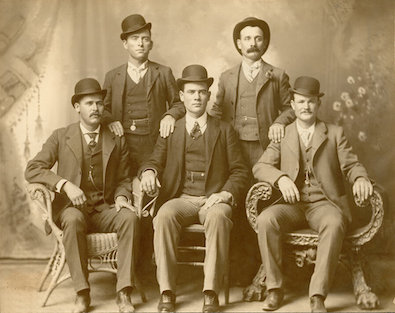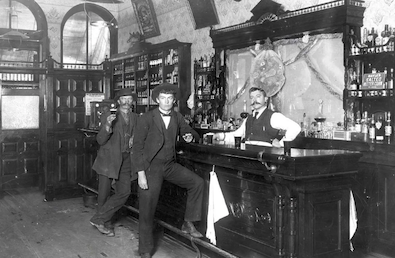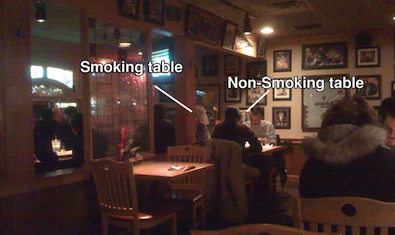
If you are setting a story in the past it can often be hard to get everything from the little things to the big picture right, especially if it's a period you haven't lived through yourself. Even then, your memory can play tricks on you.
It doesn't help that TV and movies have helped cement very false ideas about the past in our collective consciousness. We are all guilty, it seems of helping to perpetuate falsehoods about the past.
The Wild West is portrayed as full of cowboys swaggering around with six-guns, shooting, drinking, and being lawless. Except it really wasn't. Many towns made you surrender your guns when you came in. The hats cowboys wear in TV and movies are not historically accurate. Bowler hats were far more common than the ones we've all become accustomed to on the screen. The picture above is of the Wild Bunch gang that included Butch Cassidy and the Sundance Kid. A fine looking group of upstanding gentlemen, and there are other photos of them that have them wearing similar hats even when dressed more casually. 
Even the way cowboys are served drinks in a saloon is wrong. Most bars of the time let the customer pour the glass themselves. No-one asked for “two fingers” of whatever. They grabbed they bottle and poured. It was best if you didn't give yourself too much, as the bartender might be less inclined to serve you next time, however. The ‘West’ also crosses over with the first period of popular cocktail drinking. Cocktails were cheaper than straight spirits, as they were considered a watered-down drink. Yet you never see a ‘cowboy’ order a cocktail.
“Just come in from the plains, an' my whistle needs wetting.”
“What'll ya have, mister?”
“Give me a Brandy Daisy, an' go easy on the lemon juice.”
The 1876 revised edition of Jerry Thomas' classic, ‘The Bar-Tender’s Guide' contained the first known printed recipe for the Brandy Daisy. Plenty of cowpokes around then. But to have your cowboys order a cocktail would seem jarring to most readers. It just ‘feels’ wrong.
Movies and TV set in royal castles of, say, the Elizabethan era often give the impression that Kings and Queens perpetually stare brooding alone, wondering aloud about what the future may hold, usually as some assassin creeps up on them quietly in the dark. However, Queen Elizabeth probably never spent a minute alone from the moment she was coronated, or even before that. She would have had numerous people sleeping in the same room as her. She wouldn't have eaten alone, dressed alone, or even gone to the toilet alone. She certainly never asked everyone to leave the room s she could talk alone with someone. The concept of privacy as we know it was only for hermits and other oddballs. Royalty, especially, were surrounded at all times, by servants, courtiers, ladies-in-waiting, and a host of others. But even peasants all slept together in the same room. They had no choice.
When a traveller in the past enters a town and goes to an Inn there's usually a bit of dialogue about how much the room and food is going to be. It's also a standard Roleplaying scene, and most systems have price lists telling you the average cost of staying a night. However, in reality, especially in the ancient world, but also well into the Medieval period, travellers could stay for free. The food was also free. Some places would even throw in some female company completely gratis. 
Now, some enterprising innkeepers would have a better menu, and better rooms, and better companionship, which might cost some coin, but as long as you didn't mind kipping down in the common room and eating the communal stew with the other patrons, then travellers didn't have to pay anything. Travelling was dangerous. Towns wanted to encourage visitors, for the most part, to boost trade and other exchanges. Travellers were also considered a little divine in nature. They might just well be a visiting god, since they survived the wilderness out there, which was something of an epic feat, so best to treat them with respect and kindness.
More recent history is also problematic. When I re-watched The Commitments with my kids one of them asked if the hall the band were in was on fire? It wasn't. It was just that every second person in the room was smoking. The atmosphere was very murky because of that. That led to a discussion of how people used to smoke in planes, restaurants, movie theatres, offices, shops, hospitals, and many other places you just wouldn't expect today. And then we moved on to the strange period (80s and 90s) where places like planes and restaurants would have smoking and non-smoking sections, and how it wasn't actually separated, but rather side-by-side, so the non-smokers just got a slightly less in-your-face smokey experience.
However, now some production studios are editing out smoking from old movies, and refusing to include it in new period shows or movies, which may lead to that part of the past being essentially forgotten in the wider public consciousness. Is that a bad thing? Depends on your point of view, I guess.
What other things from the past do we all collective get wrong? How do you deal with such things in your own stories? Is the past truly a foreign country?
— Gunwallace
__________
Don't forget! The #quackchat has moved to BlueSky! Join us on Sunday evening for our Quackchat at 5:30PM(EST)!
You can also advertise on DrunkDuck for just $2 in whichever ad spot you like! The money goes straight into running the site. Want to know more? Click this link here! Or, if you want to help us keep the lights on you can sponsor us on Patreon. Every bit helps us!
Special thanks to our patrons!!

Collective Lies about the Past
Gunwallace at 12:00AM, April 3, 2025
4 likes!


©2011 WOWIO, Inc. All Rights Reserved Mastodon





Amelius at 9:32AM, April 7, 2025
Every article you write here is fantastic, thought provoking stuff. I personally see the attempts to sanitize the past as dangerous-- it's part and parcel with other forms of collectively gaslighting society, and I'm even talking about things I'll agree haven't aged well in the problematic sense. The 90's were particularly unkind to LGBTQ folks but I don't think removing slurs that you'll hear freely thrown around IN those spaces helps when people are out there making laws to strip these people of their rights, it just lets the hateful people pretend that the bigotry was always imagined. As for the smoking, I feel like removing it from movies destroys an entire art form of prop acting, the reality of smoking is nasty but it LOOKS cool. I assist my husband's uncle's plays (various setup and problem solving) and every show he's done features smoking, often because they're plays from the 60s, but also because it gives live actors a lot to emote with the fake cigarettes.
SoItBegins at 11:23PM, April 3, 2025
"The past is a foreign country; they do things differently there." —L.P. Hartley
Ozoneocean at 8:21PM, April 3, 2025
I hate smoking. I hated it back in the 70s and 80s when I was growing up, I hated it in the 90s as a student... But I WANT it in films, TV, comics, and books because that reality. We need to see how it was. Changing the past too much is DANGEROUS, the idea that it's just fiction is fallacious- We have Americans in places like Texas walking around openly with guns on their hips and they stupid modern cowboy hats and cowboys fiction is directly responsible for that trend. Also the myth that Hugo Boss designed the Nazi uniforms or that Nazis were stylish when the actual reality was that Nazis were super old fashioned, wearing their own COPY of uniform styles the British came up with 30 years before and the rest of the world all worse and then ditched by the 1930s. The German WW2 uniforms were the equivalent of people still wearing mullets in the 90s. In reality it was only the Italians who had designer uniforms.
Gunwallace at 12:54PM, April 3, 2025
@everyone: Yeah, I think that being 'technically right' at the expense of probably annoying your readers isn't a wise move. I am, however, always interested in the ways we (re)interpret history.
Gunwallace at 12:40PM, April 3, 2025
... Food: A Culinary History, Jean-Louis Flandrin & Massimo Montanari (eds), translated by Albert Sonnenfeld, 1999, Columbia University Press, pp.287-294. As for the supposed divinity of travellers, while perhaps no longer mistaking them for gods, such ideas did persist until the Counter Reformation period began to cement what the different strands of the Church stood for and accepted. See, for example, Keith Thomas, Religion and the Decline of Magic, London, Penguin, 1971 I was aiming for concise and pithy, not verbose and annotated.
Gunwallace at 12:40PM, April 3, 2025
@bravo1102: I only meant to refer to the traveller-specific inns that were later chartered by towns and cities, and placed either on the outskirts of the town or nearby (at a crossroads, for example). There were always plenty of other places in a town that offered food, drink, lodging, and other services,for coin, not always in a formalised setting. Traveller's inns might also serve the local population for a price. The families that were chartered to to run these establishments were often treated as social outcasts in much the same manner as butchers or those who handled the dead, and yet often their inns became the focal point of their areas. These sorts of places have a long history from ancient times to the late Middle Ages, and were not solely a European invention. The Middle East and Asia also had similar places of free lodging for travellers. Other places may have, but we lack evidence. My main source was 'The Origins of Public Hostelries in Europe' Hans Conrad Peyer, in ...
bravo1102 at 5:56AM, April 3, 2025
An important part of immersion is for the characters to take the world for granted. They don't explain things endlessly any more than you would be explaining how the electronic starter works when you turn the key to start your car.
bravo1102 at 5:53AM, April 3, 2025
Sometimes it's more important to get the feeling and atmosphere rather than the actual facts. I can rattle off the errors in any number of historical works but they feel right. They put you right there in the world and there are others where it's the author's neighborhood but everyone is wearing tights and carrying a sword and running off to kill a dragon with the elf who is just another guy with pointed ears. Yeah, like that.
PaulEberhardt at 4:49AM, April 3, 2025
@marcorossi: Totally agreed! For a setting to be plausible and enjoyable, you need to be informed, same as with any setting. In fact, I'd argue that "realistic" or "accurate" settings are actually just well-researched fantasy settings in disguise - or the story wouldn't the main thing, but we're talking about something readable here. :)
PaulEberhardt at 4:47AM, April 3, 2025
I'm always in two minds about this, even if I can get away with a lot because it's all just cartoons. That, as well as the old adage that it's always more important for a story to be good than to be true, shapes how I approach historiography: like cartoon physics, that is staying as accurate as I can exactly as long as I don't happen to come up with something funnier. Comics and novels aren't textbooks, and when I write fiction I have a strong tendency toward unreliable narrators as if to remind myself of it. Despite all that, I'll avoid propagating any of these cemented myths if I can, because else I'd feel a bit guilty. They're sometimes not just romanticism or nostalgia but were created by someone with a cultural agenda, and I know how having to debunk myths of all kinds keeps making my own and my history colleagues' day job harder than it already is.
marcorossi at 3:16AM, April 3, 2025
My solution to this problem is to only write fantasy/sci-fi stories so I'm safe! Even in fantasy or sci-fi, however, it is IMHO better to have at least a general idea of how the world workd in some period similar to the fantasy world portrayed, it can give more ideas otherwise people tend to unconsciously recycle stereotypes from other fantasy/sci-fi stories. The reason Tolkien is so good is probably because he knew a lot about ancient and middle ages, so hos world tastes very true.
bravo1102 at 12:26AM, April 3, 2025
Inns have always charged money. It's a business. Pilgrims would stay free, but there was a sliding scale for others that was often open to negotiation. There were places and times when you could stay free of charge and others where you would pay dearly. The concept of the wandering deity didn't long survive the spread of monotheistic religion. Just as there is historical myth, there is also how the Mythbusters get it wrong. Especially any of those internet lists. Do your research and try to find primary sources or works by historians rather than internet searches.